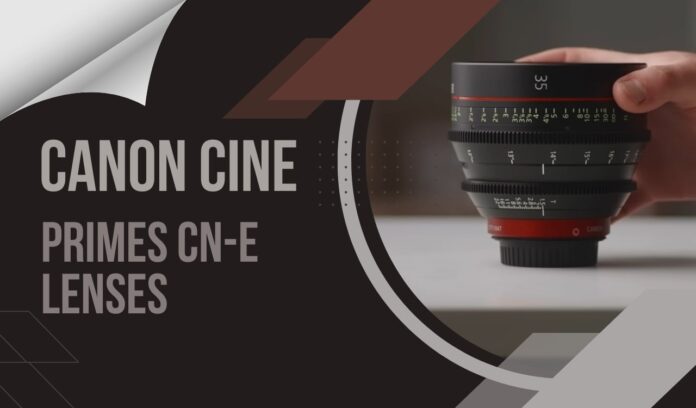If you are a cinematographer working with the Canon C100/C300/C500 cameras and in need of a good high-quality cinema zoom lens, just go ahead and purchase a set of their Canon CN-E lenses. We have been using them since they were released and we have never looked back.
The CN-E primes have an incredibly smooth focus ring, which is so important when manually focusing on a large sensor camera like the C300 or C500. There is no doubt that if you want to work quickly on set with these lenses the calibration from distance scale to actual focus point will save time when adjusting your focal length or when doing rack focusing without losing critical focus points.
Don’t be intimidated by their large size, they balance perfectly on the C300 and the matte box is still able to be used with all five lenses attached.
We have tested most of the cinema lens options available and if you truly want an “upgrade” in image quality when using a cinema zoom lens for TV or Film, these are your only choice. The reason why these lenses blow away their competition is because they were designed with one thing in mind: optics.
When designing a lens there is always more than one type of glass available to use in order to create a high-quality optical product that will resolve well in 4K resolution (or even 1080p).
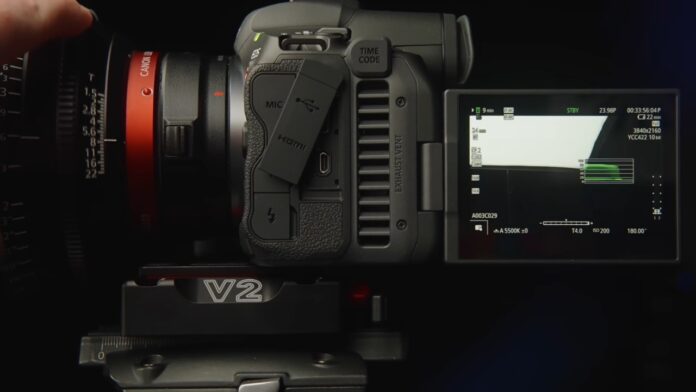
Canon decided to design and manufacture its own line of proprietary glass that they have been using in their large-aperture prime lenses for decades. The results are truly remarkable, the image is incredibly sharp with a creamy smooth bokeh and no noticeable chromatic aberration even when shooting wide open.
In order to reduce costs on these lenses, Canon made them manual only (focus and iris) which may scare some people away from purchasing or renting them because there’s no electronic communication between the lens and camera body. If you really must have electronic control of focus/iris, look into Zeiss CP2
We recently had the opportunity to work with one of my favorite directors on his latest film Spectre, this was a low-budget film that allowed me to purchase the Canon Cine primes CN-E 18-80mm T4.4 and 24-105mm T4.0 lenses for our A camera package. We couldn’t have been happier with them, they performed beautifully under all lighting conditions and in every situation, we could throw at them.
If you want top-quality optics that will look just as good or better than projectors in your local cinema, don’t even hesitate to purchase these lenses for your next production!
Design
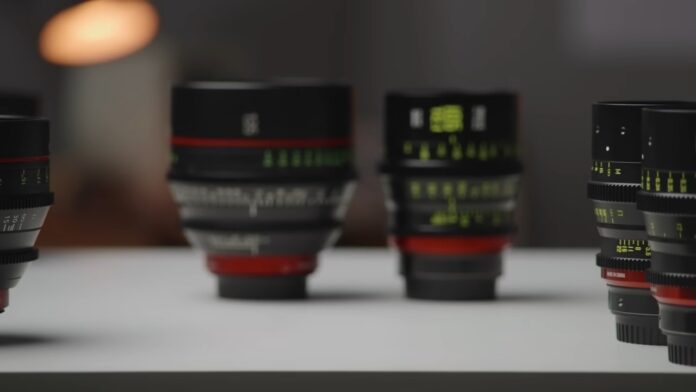
Build Quality: 10/10
We absolutely love the design of these lenses, they truly feel like a cinema lens, especially with their matte aluminum finish and large rubberized focus ring. Someone had spent a lot of time making sure all the materials used for this product were of the highest grade.
With so many plastic lenses on the market, it’s nice to finally see some well-manufactured metal in your hand when picking up one of these lenses. The only downside is the weight but in my opinion, it’s worth it because you can really feel that Canon has paid attention to every single detail in this product line.
They are very solidly built and should last anyone quite a while if properly maintained after each use, don’t ever leave them sitting in their bag just assume they will be banged around a lot.
The aperture ring isn’t as solid as the focus or iris ring, but that’s just nit-picking because it still performs fine for what it does. What Wedo appreciates about this is how quickly you can change your aperture compared to other lenses on the market where there are clicks at 1/3 stop increments which makes adjusting exposure very time-consuming.
With these lenses if you turn the aperture ring one tick past F4 you are now at T5.6, 2 ticks past F4 and you’re at T8, and so on… It saves everyone time including yourself by not having to count how many clicks you need to go up or down to reach your desired aperture.
Focus and Iris Control
The Canon CN-E lenses are designed with a focus on manual control, providing cinematographers with precise and responsive adjustments. The smooth focus ring is a standout feature, allowing for accurate and seamless focusing even when using large sensor cameras like the C300 or C500.
This level of control is particularly important for quick work on set, as the distance scale calibration ensures that you can adjust the focal length or perform rack focusing without losing critical focus points. However, it’s worth noting that these lenses do not have electronic communication with the camera body, which may be a drawback for those who prefer electronic focus and iris control.
Optics and Image Quality
Canon has gone above and beyond in designing the optics for their CN-E lenses, utilizing proprietary glass to create a high-quality optical product capable of resolving 4K resolution and even 1080p.
This attention to detail results in exceptional sharpness, a creamy smooth bokeh, and minimal chromatic aberration when shooting wide open. This superior image quality sets the CN-E lenses apart from competitors and makes them an excellent choice for professional TV and film productions.
Shooting with the CN-E 18-80mm and 24-105mm Lenses
During the production of the low-budget film Spectre, the Canon CN-E 18-80mm T4.4 and 24-105mm T4.0 lenses were used on the A camera package.
The lenses performed admirably in all lighting conditions and situations, showcasing their versatility and reliability. The 18-80mm lens is ideal for wide shots, while the 24-105mm provides longer reach and is suitable for both FHD and 4K formats.
Performance: 9/10
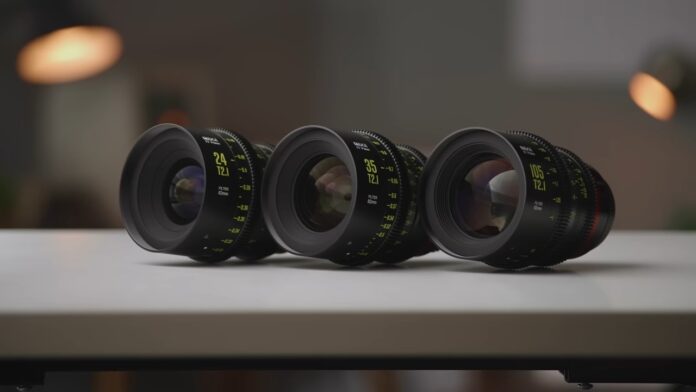
The images this lens produces are sharp and rich with color, the focus is very smooth and consistent throughout the entire range of travel on both lenses. As for distortion and chromatic aberration, it is almost non-existent and that’s quite amazing considering we were shooting digital cameras which tend to exaggerate those issues more than film ever did. These lenses performed exactly as we expected them to, there is no reason not to love them!
Once they break in a bit more you can use lower f-stops such as T2 or T1.5 but they still do best at between T4-T8. You can actually get away with using them at T2 on higher contrast scenes if you need to but be prepared for a slightly soft image.
Pros and Cons of Canon CN-E Lenses
Pros:
- Exceptional optics and image quality
- Smooth focus ring for precise control
- Durable, high-quality build
- Versatility in various lighting conditions
- Wide range of focal lengths available
Cons:
- Manual-only focus and iris control
- No electronic communication with camera body
- Weight may be an issue for some users
FAQs
1. What is the main difference between the Canon CN-E lenses and other cinema lenses on the market?
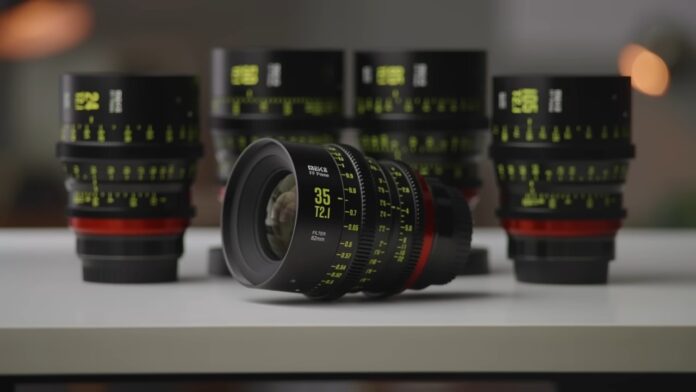
The main difference lies in the optics and image quality. Canon has designed the CN-E lenses using proprietary glass, which results in exceptional sharpness, a creamy smooth bokeh, and minimal chromatic aberration. This focus on high-quality optics sets the CN-E lenses apart from competitors, making them a top choice for professional TV and film productions.
2. Are the Canon CN-E lenses compatible with cameras other than the Canon C100, C300, and C500?
Yes, the Canon CN-E lenses are compatible with a wide range of cameras that use the EF mount. However, these lenses are specifically designed to work best with the Canon C100, C300, and C500 cameras. When used with other cameras, the performance and image quality may not be optimized to the same extent.
3. How do the Canon CN-E lenses perform in low-light conditions?
The CN-E lenses perform admirably in low-light conditions, thanks to their high-quality optics and wide aperture range. They perform best at apertures between T4 and T8 but can be used at lower f-stops like T2 or T1.5 with slightly softer images. This flexibility makes them suitable for shooting in various lighting conditions, including low-light environments.
4. Are there any adapters available for using Canon CN-E lenses with non-EF mount cameras?
Yes, there are adapters available that allow you to use Canon CN-E lenses with non-EF mount cameras.
However, using an adapter may impact the performance and image quality of the lenses. It’s important to research and select a high-quality adapter that’s compatible with your camera and the CN-E lenses to ensure the best results.
5. How does the lack of electronic communication between the lens and camera body affect the user experience?
The manual-only focus and iris control on the Canon CN-E lenses means that there’s no electronic communication between the lens and camera body.
This can be a drawback for those who prefer electronic control of focus and iris. However, manual control allows for precise adjustments and greater creative control over your images.
6. Can the Canon CN-E lenses be used for photography as well as videography?
While the Canon CN-E lenses are designed primarily for cinematography, they can also be used for photography. However, keep in mind that these lenses are manual-only, which means that you won’t have autofocus capabilities or electronic communication with your camera for photography.
If you’re comfortable with manual focus and aperture control, the CN-E lenses can produce stunning images for photography as well.
7. What kind of maintenance is required to keep the Canon CN-E lenses in optimal condition?
To ensure the longevity and optimal performance of your Canon CN-E lenses, it’s important to properly maintain them after each use. Regular cleaning of the lens elements with a soft, lint-free cloth and a specialized lens cleaning solution is essential.
Additionally, you should store the lenses in a protective case to minimize the risk of damage from dust, moisture, and impact.
8. Are there any alternatives to Canon CN-E lenses for cinematographers on a budget?
For cinematographers on a budget, the Sigma Cine lenses and the Rokinon Xeen lenses are popular alternatives that offer good image quality and performance at a lower price point.
However, keep in mind that the optical quality and overall performance may not be as exceptional as the Canon CN-E lenses. It’s essential to compare the specifications, performance, and reviews of alternative lenses to determine the best option for your needs and budget.
Conclusion
The Canon CN-E cinema zoom lenses are a valuable investment for any cinematographer working with Canon C100, C300, or C500 cameras. The exceptional optics, build quality, and performance make them an excellent choice for producing high-quality TV and film projects. Despite a few potential drawbacks, such as manual-only control and the weight of the lenses, their overall performance and image quality make them a top contender in the market.
If you are a professional videographer or cinematographer seeking an upgrade in image quality, the Canon CN-E lenses should be high on your list of considerations. Their impressive performance, solid build, and remarkable image quality will ensure that you are able to create stunning visuals that rival the best projectors in the cinema industry.

